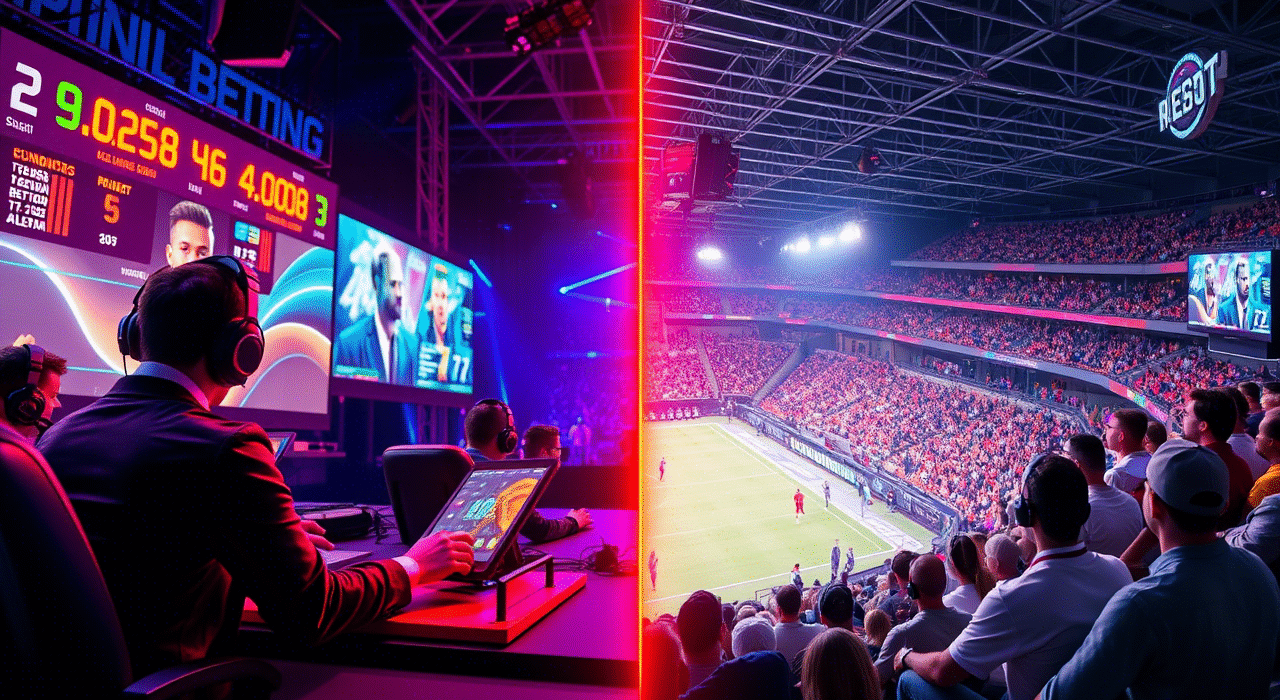🎮 The Big Bet: Are We Witnessing the Rise of a New King?
For decades, traditional sports betting—football, basketball, horse racing—has ruled the gambling world. But now, an upstart challenger is making noise: eSports betting. Fuelled by Gen Z’s gaming obsession, streaming culture, and global eSports leagues, this digital-native vertical is not just growing—it’s gunning for the crown.
So here’s the million-dollar question:
Could eSports betting overtake traditional sportsbooks by 2030? Let’s explore the hard data, psychological shifts, and market forces behind the rise.
📊 Market Pulse: Where eSports Betting Stands in 2025
In 2025, eSports betting is still a fraction of the traditional market, but the delta is closing faster than expected.
- Global Sports Betting Market (2025): ~$230 billion
- eSports Betting Market (2025): ~$20 billion
- Projected CAGR for eSports Betting (2025–2030): 13%+
- Top Titles for Betting: Counter-Strike 2, League of Legends, Dota 2, Valorant, Call of Duty
While numbers lag behind, audience growth tells a different story:
- eSports viewership (2025): ~700 million globally
- Average age of viewer: 16–34
- Platform behavior: Twitch, Kick, Discord > ESPN, Fox Sports
Takeaway: Traditional sportsbooks dominate revenue today, but they don’t own the next generation of bettors.
👾 Gen Z & Alpha: Betting as an Extension of Gaming Identity
Let’s decode the psychology. For Gen Z and Gen Alpha:
- Gaming is the primary entertainment format
- They don’t distinguish eSports from “real” sports—both are competitive, skill-based, and have fandoms
- They’re digitally native, trust online platforms, and are comfortable with virtual economies
What this means for operators:
The next wave of bettors doesn’t grow up wanting to bet on Manchester United. They grow up idolizing Faker, s1mple, or TenZ.
And unlike traditional sports bettors who might make a wager despite the UI, Gen Z demands:
- Fast interfaces
- In-play engagement
- Streamer tie-ins
- NFT or tokenized wagers
- Mobile-first or Discord-integrated betting tools
🏟️ Comparing Ecosystems: Sports vs. eSports
| Feature | Traditional Sports Betting | eSports Betting |
| Audience Age | 35–60 | 16–35 |
| Viewing Platforms | TV, apps | Twitch, YouTube, Discord |
| Betting Type | Pre-match, In-play | Live microbetting, fantasy, influencer-led |
| Latency | 10–30 seconds | Near real-time (low-latency streams) |
| Emotional Driver | Team loyalty | Player/fan identity, tribal subcultures |
| Legal Support | Well-established | Rapidly evolving, regulatory grey zones |
Conclusion: eSports betting is more culturally integrated for younger audiences and has more room for real-time innovation.
🔁 The Format Advantage: Betting Micro-Moments
In eSports, the pace of play is relentless:
- A Counter-Strike round is ~2 minutes
- A League of Legends match contains hundreds of skirmishes
- Events like “first blood,” “tower down,” or “headshot” happen constantly
This supports real-time, high-frequency betting, such as:
- Will Team A get first kill in next 60 seconds?
- Will Player X hit a headshot this round?
- Who wins the next duel?
Traditional sports just can’t compete with that granularity.
💥 Creator Economy: The X-Factor in eSports Betting
Here’s the real wild card: streamers and content creators.
Unlike sports, where athletes are distant icons, eSports stars and streamers engage with fans daily. Some already:
- Stream their own bets (on legal or grey platforms)
- Offer “community betting” experiences
- Create private wagering tournaments via Discord
- Shill prediction markets or tokenized bets
Platforms like Kick, which mixes Twitch-style content with crypto casinos, may blur the line further.
If influencer-led betting becomes a dominant model, eSports will have a monetization engine sports can’t match.
⚖️ The Roadblock: Regulation
The biggest barrier to eSports betting dominance? Legislation.
- Many regions don’t classify eSports as “real sports,” so licenses aren’t aligned
- Player ages often under 18, leading to ethical restrictions
- Match-fixing and integrity issues are harder to police in decentralized, global leagues
- Streaming platforms have spotty policies on gambling-related content
That said, countries like the UK, Malta, and parts of the US are warming up.
Expect a domino effect as:
- Integrity software improves
- AI-driven match monitoring becomes standard
- Tokenized ID systems protect underage users
- Partnerships between operators and game publishers emerge
💡 Innovation Will Decide the Winner
Traditional sportsbooks may still sit on the throne—but many aren’t innovating fast enough. Their apps are built for boomers. Their odds models are stuck in spreadsheets. Their communities are fragmented.
Meanwhile, eSports betting is iterating like a tech startup. New features launching in 2026–2030 could include:
- Metaverse-based bet lounges
- Streamer-led peer-to-peer betting pools
- In-game betting plugins directly inside titles like Valorant or Dota
- Prediction markets with real-time Twitch integration
And yes, crypto will fuel much of this ecosystem, especially for international, unbanked or youth-heavy segments.
📉 What Traditional Sportsbooks Are Getting Wrong
- Ignoring Gen Z UX Expectations
Grey UI, clunky odds tables, 10-click flows? Gen Z will bounce in 3 seconds. - No Creator Partnerships
The future of betting is creator-led, not ad-led. - Lack of Real-Time Features
“Bet on match winner” is fine—but Gen Z wants to bet on moments. - Zero Social Layer
No chat? No squads? No stream syncing? Then it’s not sticky. - Treating eSports as Just Another Market
Wrong. eSports requires its own strategy, voice, and product roadmap.
🧭 So… Will eSports Betting Overtake Sportsbooks by 2030?
It depends who you ask.
- If you’re a 45-year-old traditional bettor, maybe not.
- But if you’re 22, mobile-first, watch Twitch more than TV, and pay with crypto—eSports already won.
By 2030:
- Revenue parity could be achievable in major regulated markets
- eSports will dominate in Asia-Pacific, LatAm, and decentralized/crypto ecosystems
- Traditional sportsbooks will either adapt or decline
The future of betting isn’t just online. It’s gamified. It’s creator-driven. And it speaks in memes, clips, and Discord threads.











